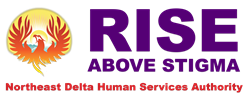
Northeast Delta Human Services Authority launches
Rise Above Stigma Project
“We recognize the impact this project will have not only on our region but the entire state and nation. I believe it will be a blueprint on how service innovations and community connections can transcend brokenness and various forms of division,” Dr. Sizer said.
MONROE, La. (PRWEB)
July 13, 2021
Northeast Delta Human Services Authority (NEDHSA) announces the launch of its Northeast Delta Human Services Authority Rise Above Stigma project in collaboration with SheRay’s & Associates, LLC. This project will engage grassroots community-based organizations, area churches, businesses, and health and human services stakeholders within the twelve parishes NEDHSA serves.
The Northeast Delta Human Services Authority Rise Above Stigma project is funded through a grant from the Louisiana Department of Health, Office of Behavioral Health (LDH-OBH), and the Substance Abuse and Mental Health Services Administration (SAMHSA).
NEDHSA Executive Director Dr. Monteic A. Sizer “we thank LDH-OBH and SAMHSA for helping us take on this enormous challenge.”
“This is a challenge we embrace and very much look forward to,” Dr. Sizer said. “We recognize the impact this project will have not only on our region but the entire state and nation. I believe it will be a blueprint on how service innovations and community connections can transcend brokenness and various forms of division.”
The health stigma reduction effort aims to help increase access to mental health and addiction treatment, provide evidence-based prevention and environmental wellness strategies, and help vulnerable communities successfully learn to navigate the often complex behavioral and primary healthcare system. This will be done using educationally, culturally, disability-based, and linguistically appropriate tools and information.
According to the National Alliance on Mental Illness (NAMI), one in five Americans is affected by mental health conditions, and stigma is toxic to their mental health because it creates an environment of shame, fear, and silence that prevents many people from seeking help and treatment.
Northeast Delta Human Services Authority’s Rise Above Stigma project will use an evidence-based model called Break the Stigma, Ask for Help, Make the call, Behavior Health (B.A.M.M.BH) as an environmental strategy. This community-based strategy will allow NEDHSA to gather valuable community-level, real-time data while working with the community to develop cross-cutting population health solutions.
Dr. Sizer said the goal is “to transform the way health and human services are delivered in our region so that overall population health can significantly improve. And to improve population health, we must reduce negative social determinants of health.”
“The Rise Above Stigma project allows us to look more closely at population risk factors,” Dr. Sizer said. “We understand that there are many systemic barriers to health-seeking behaviors in rural communities. We also understand that these barriers are rooted in history, mistrust, inefficient delivery systems, pain, and broken promises.”
The Rise Above Stigma initiative will specifically explore those non-medical factors that influence negative health outcomes and stigmas such as income, education, unemployment, food insecurity, housing, technology, and transportation.
SheRay’s & Associates Divisional Director Dr. Katrina Wyche said they are excited to partner with NEDHSA to “address the stigmas that prevent people from obtaining the services needed to improve their mental and physical health.”
“Being able to identify the stigmas and develop plans to address this public health issue that plagues our communities will have a great impact on the lives of everyone affected by these stigmas,” Dr. Wyche said.
Dr. Sizer added: “No single program or agency has all the answers, so we must work hard to remove community obstacles, overcome governmental silos, and provide access to programs and services to meet people where they are. Therefore, we will work closely with those willing to help reimagine what is possible in our region. We must be able to see a new reality and then work collectively to make it happen.”
Share article on social media or email:

